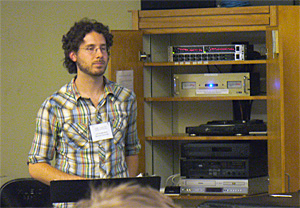 |
| Ian Dahlman of Ryerson and York Universities presents his paper on indie rock band Broken Social Scene (Ryan McNutt photo) |
Whether itтАЩs blasting out of a stereo or pumping through a pair of headphones, music surrounds us every day. ItтАЩs no wonder, then, that there are many academic researchers interested in popular music not only as form and structure, but as a way of better understanding our societyтАЩs politics, economics and culture.
This past weekend, dozens of professors and graduate students gathered at ║┌┴╧│╘╣╧═Їfor the 2009 Canadian conference of the International Association for the Study of Popular Music (IASPM). They came from a wide variety of research backgrounds тАУ from popular culture to musicology to fine arts тАУ but all shared an interest in studying the soundtrack of our lives.
The topics discussed were as wide-ranging as the most eclectic iTunes playlist. Barry Promane of the University of Western Ontario used Queen to explore rock and rollтАЩs relationship with the AIDS crisis and homophobia┬аin the 1980s. Nicholas Greco of Providence College and Seminary analyzed FeistтАЩs I Feel It All in the context of literary theorist Roland BarthesтАЩ concept of тАЬcruisingтАЭ the text. And Barbara Ching of the University of Memphis delved into how song collecting тАУ or тАЬsongcatchingтАЭ тАУ is changing in the digital age.
But doesnтАЩt talking about music in such a fashion miss the point? IsnтАЩt it just, as itтАЩs famously been described, тАЬdancing about architecture?тАЭ
тАЬWhatтАЩs so wrong with dancing about architecture?тАЭ asks Jacqueline Warwick, assistant professor in the Department of Music and chair of the local arrangements committee for the conference. тАЬWe can learn a great deal from talking about music and why people care about it. There is such an emotional connection there that, whether itтАЩs from an historical or a cultural perspective, we can learn a quite a lot.тАЭ
Over a dozen faculty, staff and students from ║┌┴╧│╘╣╧═Їwere involved in putting the conference together, which was titled тАЬGoing Coastal: Peripheries and Centres in Popular Music.тАЭ Assistant professor Steven Baur also was a presenter at the conference with a paper exploring class dynamics of 19th century blackface minstrel shows.┬а
Two student papers received special prizes from conference organizers. The first, by Tara Rodgers of McGill University, surveyed 19th- and early 20th-century literature on sound production to better understand the evolution of our conceptualization of sound forms. The second, by Ian Dahlman of Ryerson and York Universities, used the indie rock band Broken Social Scene as a case study to evaluate collectivist models of band membership.
тАЬWhat really drove me to explore [the topic] was actually the bandтАЩs self-titled album, because I felt you could feel all the ruptures and breaks and cracks,тАЭ said Mr. Dahlman. тАЬIt didnтАЩt seem like it was always necessarily a happy, utopian place but actually something that was constantly in flux and had its own share of anxiety, fear and love. It was collecting the emotion of all these constantly-shoving people in one project.тАЭ
The conference was a good fit for Dalhousie, which earlier this year launched the first masters program in musicology in the Maritimes. The degree program, which admits its first students this fall, allows students to investigate musicтАЩs role and meaning in various social and historical contexts.
